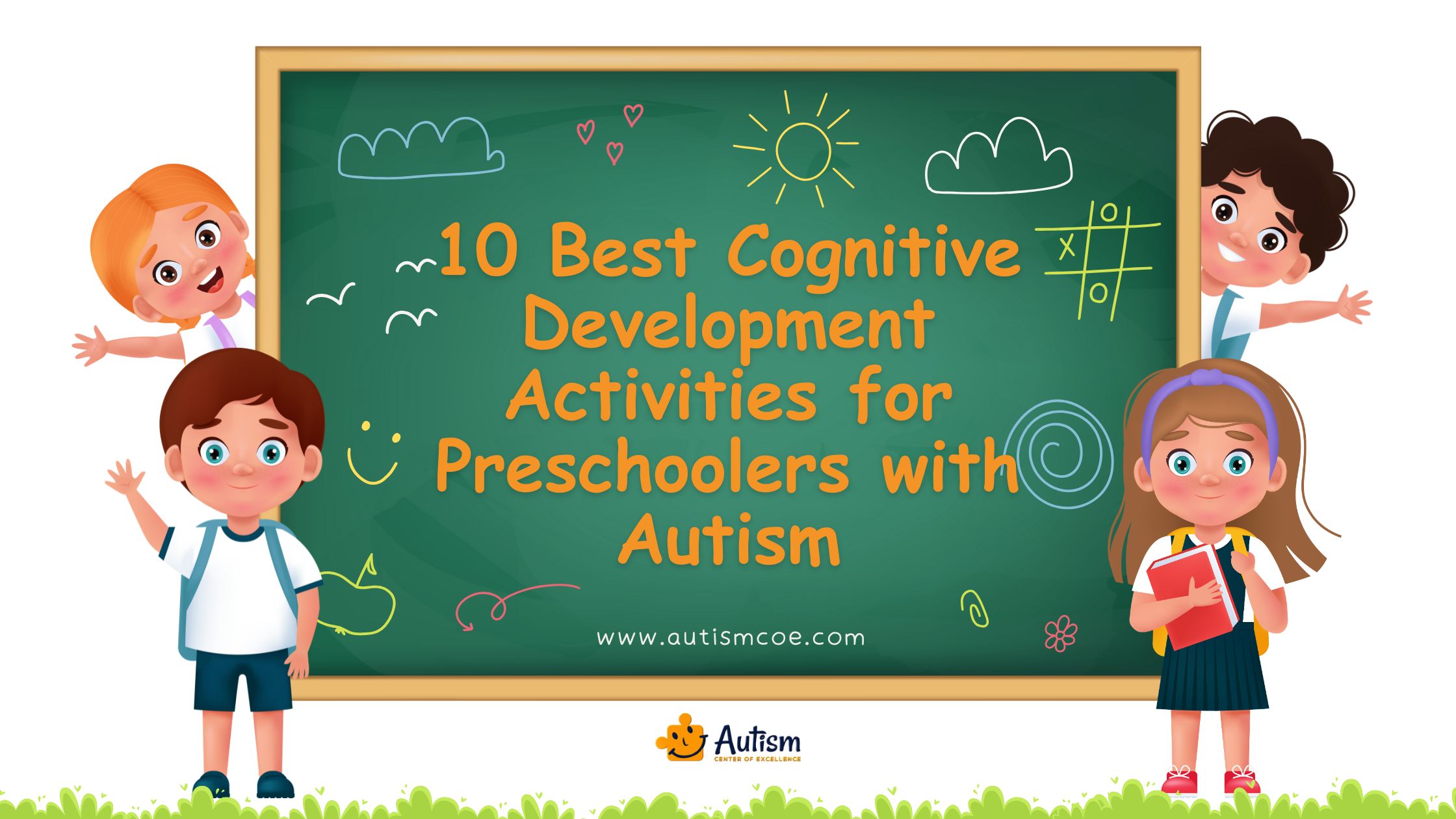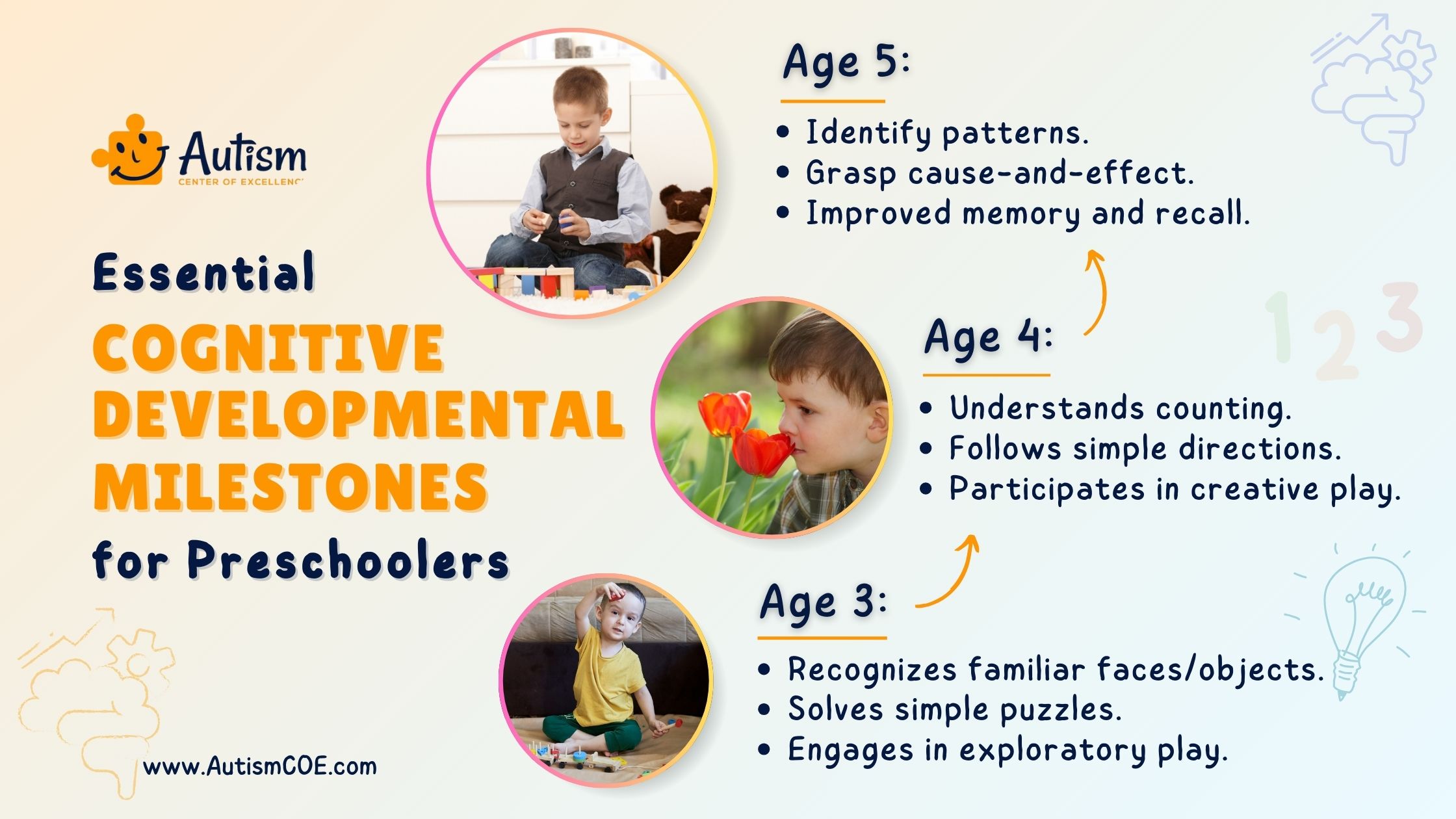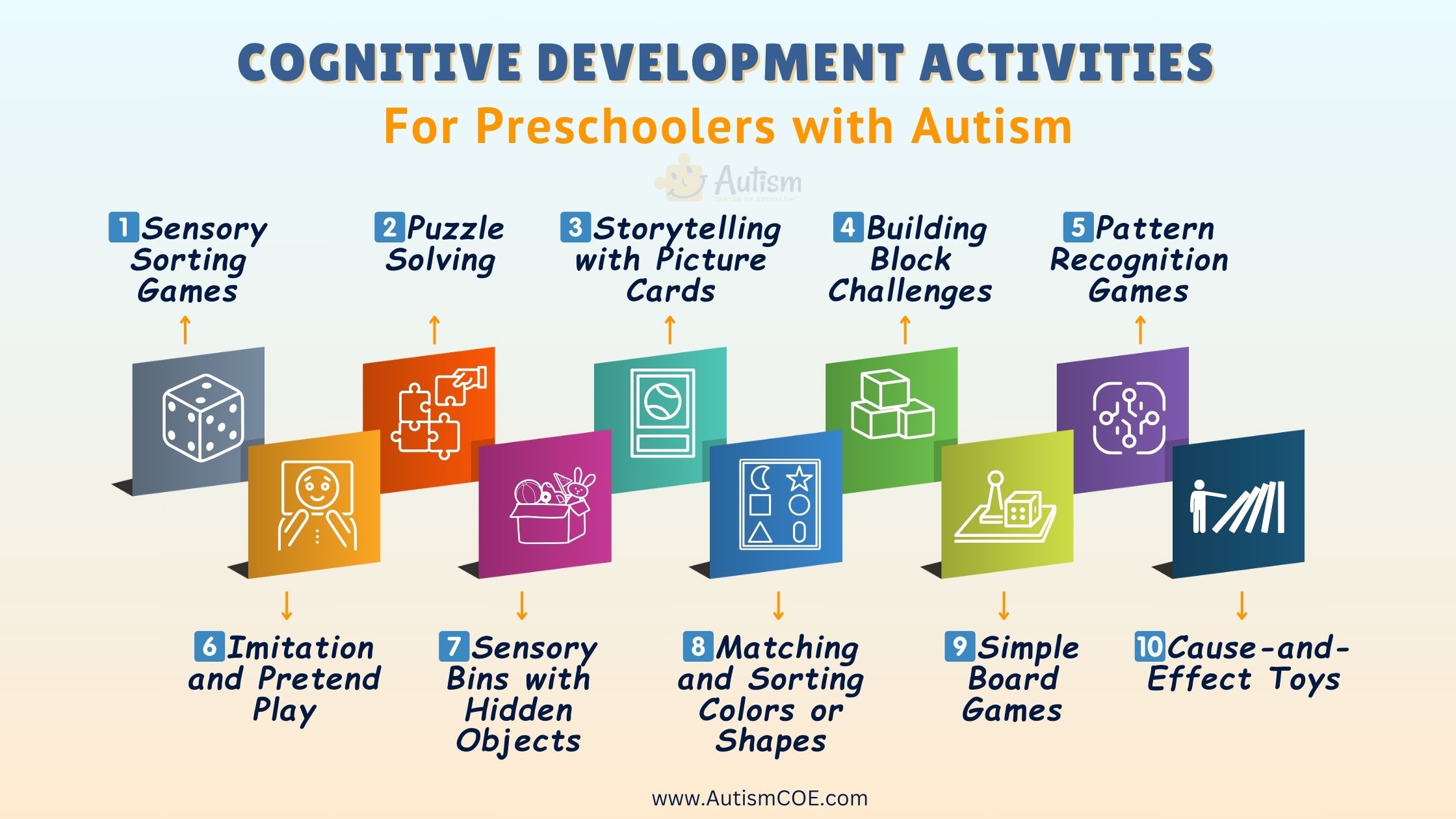Unit 39: 10 Best Cognitive Development Activities for Preschoolers with Autism

Watching preschoolers grow and learn is an incredible journey, especially for those with autism. These little ones have unique ways of seeing the world, and supporting them in their cognitive development can be both rewarding and fun. Cognitive development activities not only increase their learning abilities but also prepare them for School Readiness, thus equipping them to thrive in class.
The difference between the therapist, parent, caregiver, or educator is figuring out creative ways to boost the cognitive skills of autistic preschoolers. This blog will take you through the top ten cognitive development activities that will make these young minds bloom in confidence and curiosity, taking them on a successful learning adventure.
What is Cognitive Development in Preschoolers?
Cognitive development in preschoolers is like watching a tiny seed grow into a beautiful plant, full of potential and promise. That is exactly what it is – a process through which little children begin to learn how to think, how to understand, and how to interact with their world. They need to recall and remember things, solve some problems, and try to make sense of what they might hear or experience daily.
For children with autism, maybe in a different way, cognitive development is a very exciting journey full of milestones and discoveries. Understanding what it’s like to see cognitive development in preschoolers could help parents, caregivers, and educators assist these little explorers in finding new ways to unlock skills. Hence, the capacity for wonder and learning continues to grow in exciting ways.
Suggested – Unit 4: Cognitive Development and ABA Therapy for School Readiness
Importance of Cognitive Activities in Autism
Cognitive activities are essential for helping preschoolers with autism grow and learn in their own unique ways. These activities are like fun workouts for the brain, and they offer many benefits. Let’s explore why they are so important:
Boosts Brain Power
Cognitive development activities Improve Attention, memory, and problem-solving skills, which could make everyday learning fun and more effective.
Encourages Exploration
These activities call the child to come and explore new ideas and concepts. This makes them curious and creative when they are about to learn.
Supports Individual Learning
Cater to the individual needs of the children so that they can learn according to their required rate, with an enhanced level of confidence.
Fosters Enjoyable Learning
Their activities have made it accessible and joyous for autistic kids so that they correlate with the outer world adequately.
Builds a Strong Foundation
Incorporating these activities into daily routines can create a supportive environment where preschoolers can thrive and grow, unlocking their full potential.
Working on these few but key issues will help the young, feeble minds of kids with autism shine out by achieving their Developmental Milestones through the collaborative work of therapists, parents, caregivers, and educators.

Cognitive Developmental Milestones in Preschoolers
Understanding cognitive developmental milestones in preschoolers is a journey with well-defined and distinct stages. Now, let’s break down these developmental milestones by age group and see how little minds develop.
Age 3
- Acknowledge familiar faces and objects that help cultivate their sense of security and knowledge.
- Begin to solve simple puzzles that demonstrate early problem-solving skills.
- Demonstrate interest in their surroundings by means of exploratory play.
Age 4
- Understand the concept of count, which gives a foundation to the understanding of numeracy.
- Follow simple directions. The child will be able to boost listening and comprehension skills.
- Engage in imaginative play, which supports creativity and social understanding.
Age 5
- They can identify patterns, and with this, they can predict or understand sequences.
- The child will begin to grasp cause-and-effect relations, which further leads to rational thinking.
- They can carry more memory compared to earlier, which increases the recall of learned information.
These may come at different times and in unique ways for autistic preschoolers. Each one, no matter how small, is important and should be celebrated along the way.

Top 10 ABA-Based Cognitive Development Activities for Preschoolers with Autism
Cognitive development activities in preschool children with autism are like unlocking a treasure chest of valuable learning opportunities. Applied Behavior Analysis techniques breed essential cognitive skills in a fun and engaging way. Such activities unlock a young autistic mind by therapists, parents, caregivers, and educators so that it can grow and thrive.
1️⃣ Sensory Sorting Games
Sensory sorting games invite children to participate in a rich texture, color, and shape context. Sorting items such as soft fabrics, rough stones, or colorful blocks demands that Children Strengthen Their Sensory Processing as well as their attention skills. These games lay the groundwork for categorization and organization, which are crucial cognitive skills for understanding the world around them.
2️⃣ Puzzle Solving
Puzzles are more than pieces that fit together; they open a developed spatial awareness and problem-solving. While the child matches up shapes to complete the pictures, their hand-eye coordination improves, and their critical thinking is enhanced in the process. But it is entertaining and prepares an incredibly good base for cognitive growth.
3️⃣ Storytelling with Picture Cards
Picture cards help in transforming storytelling into vivid journeys for children. By arranging cards in sequences to narrate tales, children boost their language skills and imagination. This activity encourages them to express ideas and comprehend story structures, vital for cognitive and language development.
4️⃣ Building Block Challenges
Building blocks are the ultimate tools for creativity and learning. The child can learn balance, symmetry, and planning, whether making towers or just purely imaginative structures. Such activities help improve Fine Motor Skills and cognition by requiring strategic thinking and problem-solving.
5️⃣Pattern Recognition Games
Pattern recognition games make children think sequentially and logically. Repeated patterns of objects or colors let them develop predictive and analytical reasoning because they are the core skills of mathematical thinking and intellectual development.
6️⃣ Imitation and Pretend Play
Imitation and pretend play is the window through which children may understand social interactions and empathy. In these role-plays, children interpret social cues and come to understand new perspectives with cognitive flexibility. Such play also fosters creativity and problem-solving by asking them to think beyond the norm.
7️⃣ Sensory Bins with Hidden Objects
Tactile explorations are a huge magnetizer in sensory bins. While digging for treasure in the sand or rice, concentration, and curiosity are built into problem-solving techniques. As much as this activity provides a calming sensory experience to a Child with Autism, it can also be very suitable for preschoolers with autism.
8️⃣ Matching and Sorting Colors or Shapes
Matching and sorting activities are simple but very powerful tools for teaching categorization and recognition. The child develops logical reasoning and analytic thinking with groupings of similar colors or shapes. These skills form the foundation of the cognitive development process and support academic learning.
9️⃣ Simple Board Games (e.g., Memory Games)
Board games, including memory games, turn learning into play. Playing matching card games and remembering sequences reinforces children’s memory and concentration. These games also play an excellent social role by teaching the child how to wait for their turn and when to be patient, as well as to further enhance cognitive skills by remembering a strategy.
🔟 Cause-and-Effect Toys
Magical causes-and-effect toys are magical gadgets teaching children connections between actions and their outcomes. Whether the child has to press a button to hear a sound or flip a switch to see the light, such toys teach children action-reaction relationships. It is necessary knowledge in the process of developing logical reasoning as well as understanding the impact of their actions on their environment.
How Does ABA Therapy Support Cognitive Development?
Applied Behavior Analysis (ABA) therapy is like a superhero toolkit for helping preschoolers with autism develop their cognitive skills. By using structured techniques such as positive reinforcement and task analysis, ABA therapy breaks complex skills into more manageable pieces of skills. This would not only teach children but also get them to acquire one new skill after another. This approach help children become more confident about themselves as well as their cognitive abilities.
For instance, children can be coaxed many times to practice and improve their span of attention, memory, and problem-solving skills, which are all fundamentals in the cognitive development of autism.
ABA Therapy is an individualized approach to support; therefore, every child experiences support that is unique to them, hence a friendly way of learning. ABA therapy focuses on celebrating every small achievement and hence helps young minds shine brightly as they look forward to meeting their various cognitive milestones.
Enjoying Reading?
Join Our Weekly Newsletters!
Subscribe now to stay updated with our latest email updates.
Frequently Asked Questions & Answer
What is Cognitive Function in Autism?
Cognitive function in autism refers to the aspect of which the brain helps in the development of thinking and learning. Examples of such cognitive functions include memory, attention, and problem-solving skills. In this regard, the way people think can be something they differ on and makes them special.
How to Assess Cognitive Development for Children with Autism?
Experts assess the cognitive development of children by finding out how they understand and solve problems. By their tests of use for language, memory, and social skills applied to the child, experts are able to know the best ways that the child has to be supported in learning.
How Does Autism Affect Cognitive Development?
Autism can affect the way children learn and process things. Some children might be very good in some areas, but in other areas, it might seem very difficult for them. With activities and therapies such as ABA, they can improve and learn according to their style.
Conclusion
In exploring cognitive development activities for Preschoolers with Autism, ABA-based strategies prove invaluable. Activities such as sensory sorting games and cause-and-effect toys improve problem-solving skills, maintain attention, and enhance memory. Such activities can be woven around the daily routine of an autistic preschooler by parents, caregivers, and educators for cognitive development.
ABA therapy is crucial in children’s development, providing a structured and personalized approach. By breaking down tasks and using positive reinforcement, it helps children reach their cognitive milestones at their own pace. AutismCOE exemplifies how these techniques can be integrated into programs, providing the individualized attention necessary for each child’s growth.
These therapies and activities lay the cornerstone for lifelong learning and success for these children, celebrating each achievement in the cognitive development of preschoolers with ASD.
Please Note: The content of this blog is for informational purposes only and should not be considered a substitute for professional medical advice, diagnosis, or treatment. Consult a qualified healthcare professional for personalized guidance tailored to your specific situation.

Bhavika Bhasin
Bhavika Bhasin is the Research and Marketing officer at AutismCOE. She works with children and adults with ASD. Her clinical research includes evaluating various available autism screening and diagnosis methods and their efficacy. She is currently developing a novel screening exam that is indicated to be more accurate than the existing available exams. She is also writes articles papers for various publications.

